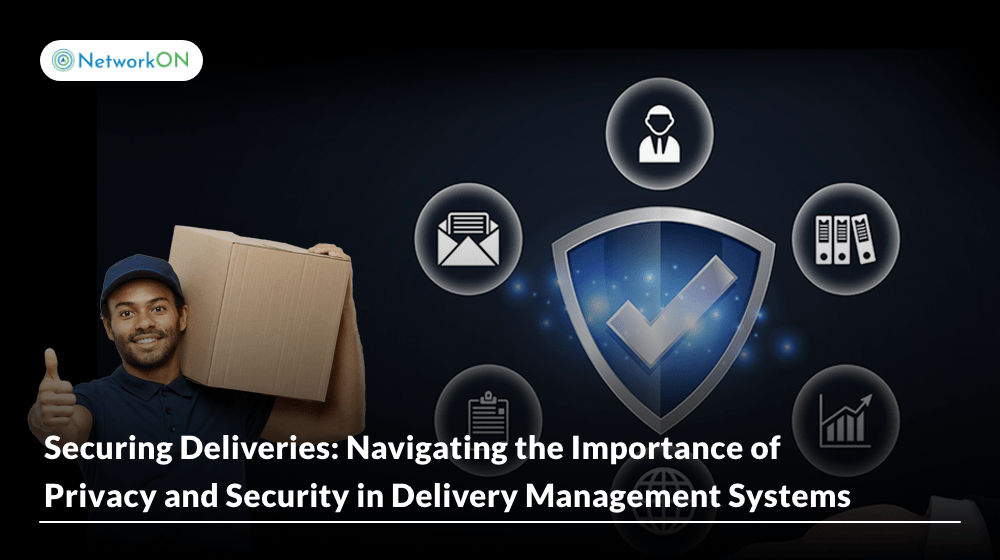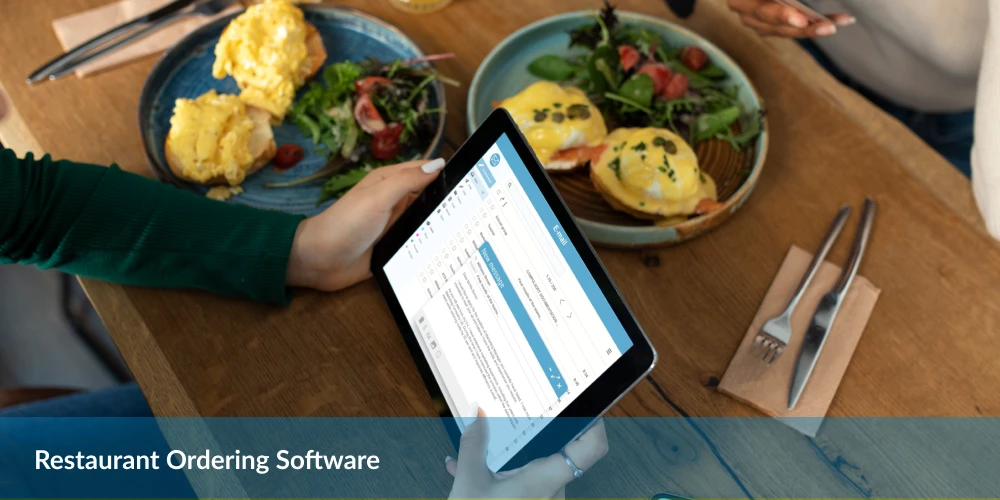Table of Contents
Delivery Management Systems (DMS) are at the heart of logistics and last-mile delivery evolution. These systems, vital for the safe and timely delivery of packages, navigate the intricate web of order processing, tracking, and handling sensitive information.
In this article, we will look at the following points and more:
- Paramount Importance of Security and Privacy: Delving into the core significance of safeguarding sensitive information in DMS, from home addresses to payment details.
- Navigating Key Components: Exploration of order processing, customer data management, and secure communication channels as crucial components in securing deliveries.
- Measures Against Threats: Highlighting the role of encryption techniques and the delicate balance between data utility and privacy to fortify DMS against potential threats.
- Adapting to Future Trends: Acknowledging the evolving landscape of DMS security and privacy, anticipating technological advancements and regulatory shifts.
- Best Practices for Organizations: Discuss practical measures, from crafting thorough policies to empowering employees with the right knowledge, for organizations to adopt.
- A Guide Through DMS Security: Presenting the content as a guide through the dynamic realm of securing Delivery Management Systems, emphasizing a commitment to a secure, private, and seamless experience.
We live in a world where doorstep deliveries have become a norm. Delivery Management Systems (DMS) are pivotal in ensuring your packages reach you safely and on time. These systems track orders and handle sensitive information, making security and privacy paramount.
Delivery Management Systems are the unsung heroes behind the scenes of your online orders. They streamline a package’s journey, from the click of the ‘buy’ button to its arrival at your doorstep.
Significance of Security and Privacy in DMS
Imagine your address, contact details, and purchase history falling into the wrong hands. That’s where security and privacy in DMS come in. Safeguarding this information protects your data from prying eyes and potential misuse.
Purpose of Safeguarding Sensitive Information in Delivery Processes
The purpose is crystal clear: to protect your data. Whether it’s your home address, phone number, or the items you order, keeping this information secure prevents unauthorized access and keeps your privacy intact.
Key Components of Delivery Management Systems
- Order Processing and Tracking: Secure processing ensures your payment details are protected when you place an order. Tracking mechanisms in DMS keep you informed and pose potential privacy concerns. Imagine someone knowing exactly where your package is at any given moment – it’s a double-edged sword.
- Customer Data Management: DMS deals with your personal information, from your address to your name. Proper handling of this data is crucial to prevent unauthorized access and protect you from potential identity theft.
- Communication Channels: Securing communication between everyone involved – from the delivery person to the customer support team – is essential. This prevents any chance of interception and keeps sensitive information safe from data breaches.
Now, let’s discuss each component in more detail.
Order Processing and Tracking
- Importance of Secure Order Processing: Secure order processing is the foundation of a trustworthy delivery system. Your payment information is like a secret code when you buy something online.
Secure processing ensures that this code stays safe. It’s like sending your money on a secret mission – you want to ensure it reaches its destination without any villains trying to steal it.
- Tracking Mechanisms and Potential Privacy Concerns: Ever wonder how you can track your package’s journey from the warehouse to your doorstep? Tracking mechanisms! While they keep you in the loop, they also raise privacy concerns.
Imagine if anyone could know exactly where your package is at all times. Striking the right balance is crucial – keeping you informed without giving away too much about your package’s location.
Customer Data Management
- Collection and Storage of Customer Information: When you order something online, the system collects information about you – your name, address, and sometimes even your favourite colour. Properly managing this information is like keeping a secret diary safe. It ensures that your details are stored securely, and only those who need to know can access them.
- Risks Associated with Unauthorized Access: Consider your personal information a treasure. Unauthorized access is like a sneaky thief trying to steal that treasure. Risks of unauthorized access include identity theft or someone pretending to be you. Secure customer data management acts as a fortress, protecting your treasure from these sneaky thieves.
Communication Channels
- Securing Communication Between Stakeholders: Communication is key, but it needs to be like a secret code language in the world of deliveries. Securing communication means making sure that only the right people understand the messages. It’s like having a private conversation that no one else can eavesdrop on.
- Preventing Interception and Data Breaches: Imagine your delivery details being intercepted by someone with bad intentions. Preventing interception and data breaches is like putting a force field around your information. It ensures that your delivery details stay between you and the delivery team without unwanted guests trying to sneak in.
Threats and Challenges in Delivery Management Systems
Malware Attacks
Malware attacks are like digital viruses aiming to infect the system. In the world of deliveries, this could mean someone trying to sneak in harmful software to disrupt operations. Think of it as a superhero battle – the system needs strong shields to fend off these digital villains.
Phishing Attempts
Phishing attempts are like cunning schemes to trick the system into revealing sensitive information. It’s akin to a disguised villain trying to sneak past security. Recognizing and avoiding these tricks is essential to keeping the system and your data safe.
Data Breaches
Data breaches are like a heist in the digital world. If successful, they expose sensitive information to unauthorized parties. It’s crucial to have a robust defence system – think of it as a virtual vault with layers of security to prevent unauthorized access.
Insider Threats
Employee Access and Data Mishandling
Insider threats involve someone on the inside – maybe an employee – misusing their access. It’s like having a trusted ally turn into a foe. Proper training and access controls act as the superhero team to prevent any mishandling of data by those on the inside.
Vendor-Related Risks
Sometimes, the threat comes from external partners or vendors. It’s like inviting guests into your home – you want to ensure they won’t cause trouble. Ensuring vendors follow strict security protocols is crucial to keeping the entire delivery ecosystem safe.
Regulatory Compliance
Like traffic rules keep roads safe, data protection regulations secure digital spaces. An overview of these regulations is like understanding the rules of the road – essential for a smooth and safe journey.
Not following these regulations is like driving without a seatbelt – it might seem okay until something goes wrong. The implications of non-compliance can range from fines to reputational damage. Any delivery system must stay on the digital law’s right side.
Security Measures for Delivery Management Systems
- Encryption Techniques: Imagine your data as a secret message. It’s like sending this message through a secure, invisible tunnel during transit. Encryption is the superhero that turns your message into a secret code, ensuring that even if someone tries to intercept it, they can’t understand a word.
- Implementing End-to-End Encryption: End-to-end encryption is like putting your secret message into a magical box that only the intended recipient can open. It ensures that your data remains private throughout its journey, from when it leaves the sender until it reaches the intended receiver.
- Access Controls and Authentication: Access controls are like security guards at checkpoints. Role-based access ensures that only the right people have access to specific information. It’s like having a VIP pass – you get access to what you need, nothing more.
- Two-Factor Authentication: Two-factor authentication is like having a double lock on your front door. It adds an extra layer of security by requiring a password and another verification method, such as a code sent to your phone. This way, even if someone gets your password, they still need that extra key.
- Conducting Vulnerability Assessments: Vulnerability assessments are like health check-ups for the system. They identify potential weak points that digital villains could exploit. Just as you’d visit a doctor for a check-up, these assessments help keep the system robust and healthy.
- Periodic Penetration Testing: Penetration testing is like hiring a friendly hacker to test the system’s defences. This ‘friendly hacker’ tries to find ways to break in, revealing any vulnerabilities before the bad guys do. It’s a proactive way to stay one step ahead in the digital security game.
Privacy Measures for Delivery Management Systems
Think of your data as a superhero’s secret identity. Data anonymization and pseudonymization are like giving your superhero a mask. It protects customer identities by replacing sensitive information with pseudonyms or making it completely anonymous, ensuring that individual identities remain hidden even if there’s a data leak.
It’s a delicate dance between using data for better services and respecting privacy. Balancing data utility and privacy is like finding the right rhythm – ensuring that while data helps improve services, it doesn’t compromise the privacy of individuals.
- Clearly Defining Data Usage Policies: Privacy policies are like rulebooks. They clearly define how your data will be used and protected. Having these policies in plain language is crucial, ensuring everyone understands the game’s rules. Think of it as having a playbook for how your data is handled.
- Obtaining Explicit Consent for Data Processing: User consent is like asking for permission before entering someone’s house. It’s a respectful way of saying, “Can we use your data for this purpose?” Obtaining explicit consent ensures that users know how their data will be used and willingly agree to it.
- Communicating How Data Is Collected and Used: Transparency is like turning on the lights in a room. Communicating how data is collected and used is crucial. It ensures that users know the process, making it easier to trust the system. It’s like showing them the behind-the-scenes of the data journey.
- Providing Customers with Control Over Their Data: Giving customers control over their data is like handing them the steering wheel. It allows them to decide what information they’re comfortable sharing and what they want to keep private. It’s all about empowering individuals to have a say in handling their data.
Successful Implementation of Security and Privacy Measures in DMS
A prominent Delivery Management System (DMS) implemented robust security and privacy measures in a success story. They ensured customer data remained secure through encryption, access controls, and transparent communication.
By embracing data anonymization and clear privacy policies, they built trust with users, resulting in a seamless and protected delivery experience.
Examples of Data Breaches and Their Consequences
On the flip side, some DMSs faced data breaches. In one instance, a lack of encryption and weak access controls led to unauthorized access. Customer data was exposed, leading to identity theft and financial losses. This highlights the importance of implementing strong security measures to prevent such breaches and their severe consequences.
Best Practices for Organizations
Crafting a thorough security and privacy policy is like setting the game’s rules. Clearly defining how data is handled, secured, and used creates a solid foundation. It ensures regulatory compliance and builds trust with users who know their information is in safe hands.
- Employee Training Programs: Employees are the front line of defence. Implementing training programs equips them with the knowledge to recognize and respond to security threats. It’s like arming them with superhero skills, ensuring they play a crucial role in maintaining the integrity of the DMS.
- Collaboration with Cybersecurity Experts and Regulatory Bodies: Collaboration is key to staying ahead of evolving threats. Organizations partnering with cybersecurity experts and staying in sync with regulatory bodies are like joining forces with superheroes. It ensures that the DMS remains up-to-date with the latest security standards and is prepared to tackle emerging challenges.
Future Trends in Security and Privacy for DMS
Technological advancements like blockchain and advanced AI are like the next generation of superheroes. They can potentially revolutionize security in DMS, offering enhanced encryption and threat detection capabilities. Exploring and adopting these technologies can be the key to preventing cyber threats.
Anticipated Changes in Regulatory Landscape
The regulatory landscape is ever-evolving. Anticipating changes and proactively adapting policies is like navigating through changing weather conditions. Organizations that stay informed and adjust their security and privacy measures accordingly will be better positioned to thrive in a dynamic regulatory environment.
In conclusion, the journey of securing Delivery Management Systems involves:
- Learning from both successes and failures.
- Implementing best practices.
- Staying ahead of the curve in a constantly evolving digital landscape.
Final Thoughts
In the intricate web of online deliveries, the twin pillars of security and privacy stand tall as the unsung heroes. We’ve witnessed how robust security measures safeguard against cyber threats, and privacy practices protect the personal data entrusted to Delivery Management Systems (DMS).
From secure order processing to transparent data handling, every aspect plays a crucial role in ensuring the integrity of the delivery ecosystem. The journey involves implementing security and privacy measures and embracing them as fundamental principles. It’s a commitment to deliver packages and trust, reliability, and peace of mind to every user.
NetworkON helps you take responsibility in delivering parcels and delivering a promise – a promise of a secure, private, and seamless experience for every user, ensuring that the last mile of the journey is as safe as the first click.
Learn more about NetworkON today! Email us at info@networkon.io or visit our website for more details.





0 Conversations